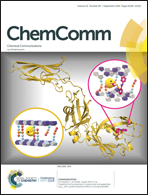Freezing promoted hybridization of very short DNA oligonucleotides†
Abstract
Shorter DNA probes provide better specificity for hybridization, but they may not form stable duplexes at room temperature. In this study, we used thiazole orange to follow DNA hybridization upon freezing and achieved stable 5-mer duplex DNA. Using multiple short probes in tandem, long DNA could also be studied. This study provides insights into DNA hybridization in the frozen state and expands the application of freezing for nucleic acid chemistry.



 Please wait while we load your content...
Please wait while we load your content...